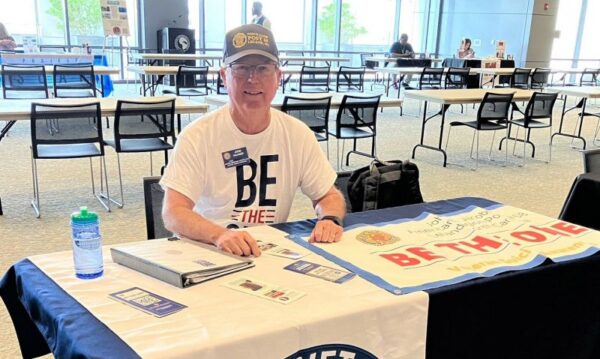Members of John E. Jacobs American Legion Post 68 in Leland, N.C., are taking the lead in their community with Be the One – The American Legion’s suicide prevention awareness initiative to end veteran suicide and destigmatize the need to ask for help. John Hacker, Post 68 vice commander, is giving a 20-minute PowerPoint presentation monthly on Be the One at a variety of venues, such as churches, Chambers of Commerce, businesses and other service organizations (Kiwanis, Rotary Club).
“My belief is that to save a vet as well as Be the One, it has to be local because we’re the ones here in the field that’s working with veterans, the community and the community knows us, they identify with us,” Hacker said. And when he gives a Be the One presentation or is advocating throughout the community, Hacker uses resources from theBe the One website such as the customizable brochure and banner.
Hacker’s presentation starts off with him stating that “suicide is a scary word, and everybody’s been around it in some way. It’s affected us, and veteran suicide is a tragedy. We take our very best citizens, and we bring them in the military, train them to be the best in the world. Then they come out of the military and those first couple of years is probably the most critical time for them to get adjusted back into the civilian world.”
Hacker understands the criticalness of those first few years following the transition from military to civilian life. That’s why he’s making Be the One his mission.
Eric, who was in the same Army unit as Hacker, came to Hacker following their return home from Vietnam. He said, “‘You know Hack, Vietnam has got me all messed up. Tell me what to do. You’ve always told us what to do, how to do things.’ I said, ‘You take Vietnam, you put it in a box, you tape it up real tight, you stick it in the back of a closet somewhere. You forget about it, and you go back to school.’”
About 17 years after that conversation, Hacker learned that Eric died by suicide two years following service. “That really struck me because I thought, did I have something to do with that? As I do more of my research, we know the first two to three years after they get out of the service is the most critical part. If we can catch them and help them in those first two or three years, we might be able to save a life.”
During his presentation he shares the conversation with Eric. Then Hacker shows a photo of Eric and says, “There’s my why. There’s my reason why I do this.” Then he implores the community to Be the One.
“The American Legion is made up of a legion of veterans,” Hacker said. “The veterans I deal with have retired and now they want to give back to their community and the Legion takes the lead. We are the biggest (veteran service organization), and we can make a difference. We are making a difference in Brunswick County here in Leland. We are the one.”
In the several Be the One presentations Hacker has given within the community of Leland, the response has been “amazing,” Hacker said, adding he received a standing ovation at one. “People ask me, ‘How do I talk to a veteran?’ I say, ‘Let’s practice.’”
Hacker said it’s important to ask a veteran their MOS (military occupational specialty). “Veterans understand their MOS probably better than their Social Security Number. When you find out what their MOS is and you share yours, we create that relationship. That’s what you have to do. You have to create a relationship with the veteran and that’s what we advocate.”
